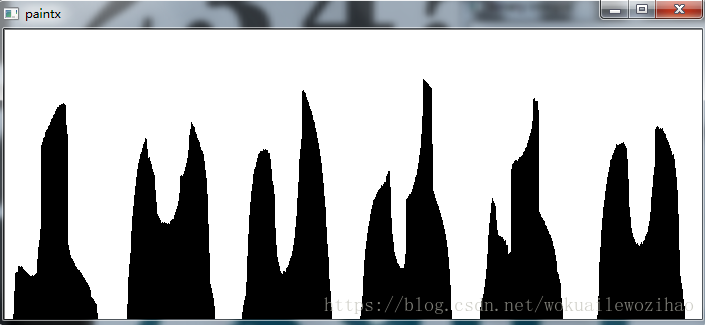前段时间做爬虫,涉及到对图片验证码的破解,这里罗列一些常用的图像处理方法,都很简单并没用到什么复杂的算法,所以不涉及opencv,都是一些直接对rgb像素点的操作,很简单也很好理解,至于识别直接用的tesseract-ocr,也可以用svm。(ps:图片的像素值矩阵的原点在左上角,上边是x轴,左边是y轴)
1、灰度化和二值化,即把彩色图片经过灰度化和二值化变成只有黑白(只有0,1的矩阵)的数据,便于后续对图片的处理
public static BufferedImage grayImage(BufferedImage bufferedImage) throws Exception { int width = bufferedImage.getWidth(); int height = bufferedImage.getHeight(); BufferedImage grayBufferedImage = new BufferedImage(width, height, bufferedImage.getType()); for (int i = 0; i < bufferedImage.getWidth(); i++) { for (int j = 0; j < bufferedImage.getHeight(); j++) { final int color = bufferedImage.getRGB(i, j); final int r = (color >> 16) & 0xff; final int g = (color >> 8) & 0xff; final int b = color & 0xff; int gray = (int) (0.3 * r + 0.59 * g + 0.11 * b); int newPixel = colorToRGB(255, gray, gray, gray); grayBufferedImage.setRGB(i, j, newPixel); } } return grayBufferedImage; } /** * 颜色分量转换为RGB值 * * @param alpha * @param red * @param green * @param blue * @return */ private static int colorToRGB(int alpha, int red, int green, int blue) { int newPixel = 0; newPixel += alpha; newPixel = newPixel << 8; newPixel += red; newPixel = newPixel << 8; newPixel += green; newPixel = newPixel << 8; newPixel += blue; return newPixel; } public static BufferedImage binaryImage(BufferedImage image) throws Exception { int w = image.getWidth(); int h = image.getHeight(); float[] rgb = new float[3]; double[][] zuobiao = new double[w][h]; int black = new Color(0, 0, 0).getRGB(); int white = new Color(255, 255, 255).getRGB(); BufferedImage bi= new BufferedImage(w, h, BufferedImage.TYPE_BYTE_BINARY);; for (int x = 0; x < w; x++) { for (int y = 0; y < h; y++) { int pixel = image.getRGB(x, y); rgb[0] = (pixel & 0xff0000) >> 16; rgb[1] = (pixel & 0xff00) >> 8; rgb[2] = (pixel & 0xff); float avg = (rgb[0]+rgb[1]+rgb[2])/3; zuobiao[x][y] = avg; } } //这里是阈值,白底黑字还是黑底白字,大多数情况下建议白底黑字,后面都以白底黑字为例 double SW = 192; for (int x = 0; x < w; x++) { for (int y = 0; y < h; y++) { if (zuobiao[x][y] < SW) { bi.setRGB(x, y, black); }else{ bi.setRGB(x, y, white); } } } return bi; } // 自己加周围8个灰度值再除以9,算出其相对灰度值 public static double getGray(double[][] zuobiao, int x, int y, int w, int h) { double rs = zuobiao[x][y] + (x == 0 ? 255 : zuobiao[x - 1][y]) + (x == 0 || y == 0 ? 255 : zuobiao[x - 1][y - 1]) + (x == 0 || y == h - 1 ? 255 : zuobiao[x - 1][y + 1]) + (y == 0 ? 255 : zuobiao[x][y - 1]) + (y == h - 1 ? 255 : zuobiao[x][y + 1]) + (x == w - 1 ? 255 : zuobiao[x + 1][y]) + (x == w - 1 || y == 0 ? 255 : zuobiao[x + 1][y - 1]) + (x == w - 1 || y == h - 1 ? 255 : zuobiao[x + 1][y + 1]); return rs / 9; }
2、降噪(领域检测法),针对二值化后的图片来说(白底黑字),噪点就是图片中一堆密集黑色像素点中少许白色像素点(字体里的白点或背景里的黑点),这时,解决方法可以遍历像素点,一个像素点周围有8个像素点,如果这个像素点周围有6个以上像素点是黑色就可以把这个像素点也认为是黑色:
/** * 降噪,以1个像素点为单位(实际使用中可以循环降噪,或者把单位可以扩大为多个像素点) * @param image * @return */ public static BufferedImage denoise(BufferedImage image){ int w = image.getWidth(); int h = image.getHeight(); int white = new Color(255, 255, 255).getRGB(); if(isWhite(image.getRGB(1, 0)) && isWhite(image.getRGB(0, 1)) && isWhite(image.getRGB(1, 1))){ image.setRGB(0,0,white); } if(isWhite(image.getRGB(w-2, 0)) && isWhite(image.getRGB(w-1, 1)) && isWhite(image.getRGB(w-2, 1))){ image.setRGB(w-1,0,white); } if(isWhite(image.getRGB(0, h-2)) && isWhite(image.getRGB(1, h-1)) && isWhite(image.getRGB(1, h-2))){ image.setRGB(0,h-1,white); } if(isWhite(image.getRGB(w-2, h-1)) && isWhite(image.getRGB(w-1, h-2)) && isWhite(image.getRGB(w-2, h-2))){ image.setRGB(w-1,h-1,white); } for(int x = 1; x < w-1; x++){ int y = 0; if(isBlack(image.getRGB(x, y))){ int size = 0; if(isWhite(image.getRGB(x-1, y))){ size++; } if(isWhite(image.getRGB(x+1, y))){ size++; } if(isWhite(image.getRGB(x, y+1))){ size++; } if(isWhite(image.getRGB(x-1, y+1))){ size++; } if(isWhite(image.getRGB(x+1, y+1))){ size++; } if(size>=5){ image.setRGB(x,y,white); } } } for(int x = 1; x < w-1; x++){ int y = h-1; if(isBlack(image.getRGB(x, y))){ int size = 0; if(isWhite(image.getRGB(x-1, y))){ size++; } if(isWhite(image.getRGB(x+1, y))){ size++; } if(isWhite(image.getRGB(x, y-1))){ size++; } if(isWhite(image.getRGB(x+1, y-1))){ size++; } if(isWhite(image.getRGB(x-1, y-1))){ size++; } if(size>=5){ image.setRGB(x,y,white); } } } for(int y = 1; y < h-1; y++){ int x = 0; if(isBlack(image.getRGB(x, y))){ int size = 0; if(isWhite(image.getRGB(x+1, y))){ size++; } if(isWhite(image.getRGB(x, y+1))){ size++; } if(isWhite(image.getRGB(x, y-1))){ size++; } if(isWhite(image.getRGB(x+1, y-1))){ size++; } if(isWhite(image.getRGB(x+1, y+1))){ size++; } if(size>=5){ image.setRGB(x,y,white); } } } for(int y = 1; y < h-1; y++){ int x = w - 1; if(isBlack(image.getRGB(x, y))){ int size = 0; if(isWhite(image.getRGB(x-1, y))){ size++; } if(isWhite(image.getRGB(x, y+1))){ size++; } if(isWhite(image.getRGB(x, y-1))){ size++; } //斜上下为空时,去掉此点 if(isWhite(image.getRGB(x-1, y+1))){ size++; } if(isWhite(image.getRGB(x-1, y-1))){ size++; } if(size>=5){ image.setRGB(x,y,white); } } } //降噪,以1个像素点为单位 for(int y = 1; y < h-1; y++){ for(int x = 1; x < w-1; x++){ if(isBlack(image.getRGB(x, y))){ int size = 0; //上下左右均为空时,去掉此点 if(isWhite(image.getRGB(x-1, y))){ size++; } if(isWhite(image.getRGB(x+1, y))){ size++; } //上下均为空时,去掉此点 if(isWhite(image.getRGB(x, y+1))){ size++; } if(isWhite(image.getRGB(x, y-1))){ size++; } //斜上下为空时,去掉此点 if(isWhite(image.getRGB(x-1, y+1))){ size++; } if(isWhite(image.getRGB(x+1, y-1))){ size++; } if(isWhite(image.getRGB(x+1, y+1))){ size++; } if(isWhite(image.getRGB(x-1, y-1))){ size++; } if(size>=8){ image.setRGB(x,y,white); } } } } return image; } public static boolean isBlack(int colorInt) { Color color = new Color(colorInt); if (color.getRed() + color.getGreen() + color.getBlue() <= 300) { return true; } return false; } public static boolean isWhite(int colorInt) { Color color = new Color(colorInt); if (color.getRed() + color.getGreen() + color.getBlue() > 300) { return true; } return false; } public static int isBlack(int colorInt, int whiteThreshold) { final Color color = new Color(colorInt); if (color.getRed() + color.getGreen() + color.getBlue() <= whiteThreshold) { return 1; } return 0; }
3、切割字符串,比如识别验证码时,可能需要将每个字符给单独切割下来进行单独识别,准确率会高得多,如果验证码字符之间粘连度不高,可以使用最简单的投影法,即,x轴上的每一列有多少个黑色像素点,这样形成了一个数组,针对这个数组可以想象成一个折线图,如果图片没有粘连那最理想的效果是这样:


如果有粘连,那就是一个有波峰波谷的折线图,只有通过算法找到波峰波谷来切割了;同理,对y轴也可以进行投影。opencv的话,还有个常用的轮廓法,需要的可以了解下(吐槽:java版的opencv和c++版本的api稍有不同,这个只有看官方文档了)
4、裁剪,把上一步的像素点区域找到(原点+宽高)即可裁剪。
5、识别,如果字体扭曲的不是很严重的话,推荐直接使用tesseract-ocr简单方便,java包好像叫tess4j,也可以自己用svm;字体扭曲严重的话,只有自己写算法了,这种情况还是建议使用opencv来处理,有相应的处理方法的。
6、图片相似度,像有些验证码扭曲的厉害确实破解不了的(md,难道要上神经网络喂几万张图片去识别么,拜托,我只是爬个数据而已,还是不费力气了~~),




但是,我之前碰到过有些网站虽然破解不了,但是验证码图片数量是固定的,比如裁判文书网,爬了几千张下来才发现基本上都是重复的,之前的白弄了。其实可以直接hash的,但是为了扩展和复用,还是弄个图片相似度,其实原理差的不多,还是图片预处理后再进行hash,形成每张图片独有的指纹。
PS:简单的可以自己处理像素,也便于学习和加深理解,更复杂的建议还是使用opencv吧~~
这里可以简单说说我最开始怎么处理裁判文书网的验证码的,准确率只有60%左右(大部分8,90%多的图片能分割出来,识别就不行了);字体,背景色,干扰线,噪点,颜色基本都不一样,通过某些算法区分这几个区域(分类算法很多,kmeans最简单效果也行),然后挨着边缘的是干扰线先去掉(需要与二值化后的进行对比确认干扰线),中间区域分类颜色最多的是字体,然后去掉其他区域,再二值化分割判断。缺点:有些图片干扰线和字体颜色很接近分不出来,去掉干扰线把字体的一部分也除掉了。大家还有没有什么好的方法
本文转载自:https://blog.csdn.net/wokuailewozihao/article/details/79742651




